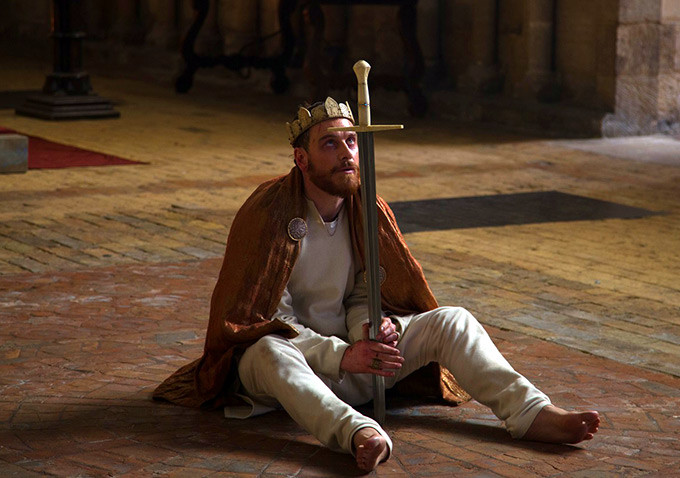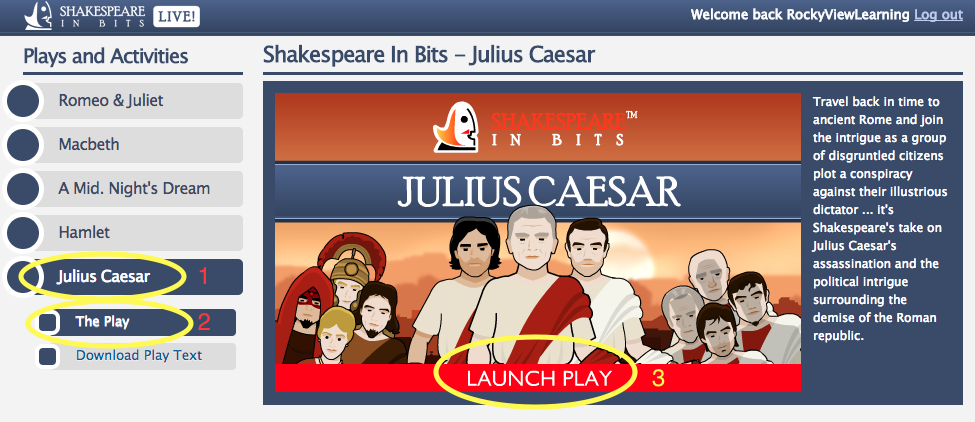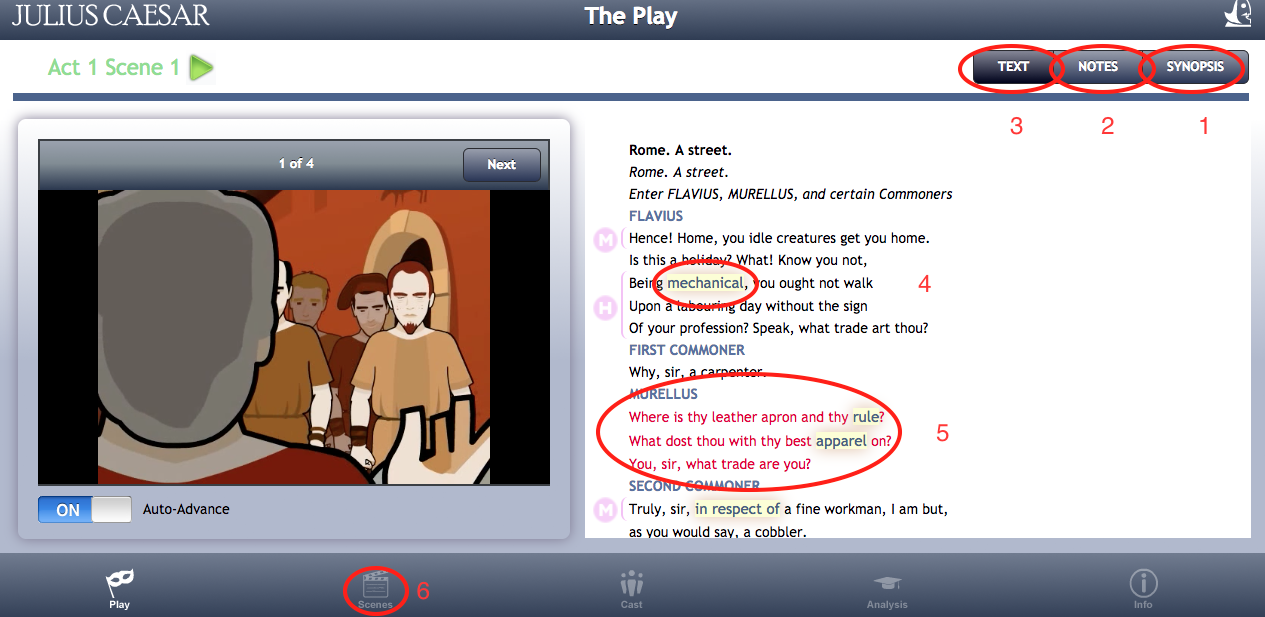MAR 30: Lesson Five - Macbeth
| Site: | MoodleHUB.ca 🍁 |
| Course: | ELA 20-1 |
| Book: | MAR 30: Lesson Five - Macbeth |
| Printed by: | Guest user |
| Date: | Friday, 26 December 2025, 8:24 AM |
Introduction
Lesson Five - Macbeth
Duration - 9 blocks (9 x 80 min + homework)
"Something wicked this way comes." - Witch, Macbeth

"Shakespeare's works, whether they be tragedy or comedy, fantasy or history, deal with characters who are larger than life and yet very real. So real in fact, that one cannot help but identify with their fortunes and failures, characteristics and conflicts.
"There is fire and life in Shakespeare which still burns brightly even after four hundred years.
"In 1623, Ben Jonson heralded Shakespeare as being 'not of an age but for all time' Several hundred years later, Russian novelist Leo Tolstoy (1828-1910) declared that 'Shakespeare is crude, immoral, vulgar, and senseless.' Who was right? Perhaps, like most things in life, it depends on your point of view and attitude. Shakespeare himself wrote that "Nothing is either good or bad but thinking makes it so." - Introducing Shakespeare, The Global Shakespeare Series
In this lengthy, multi-part lesson you will
- read about the history of drama
- review the elements of drama, dramatic conventions, and types of drama
- be introduced to the source, setting, characters and plot of Macbeth
- explore various websites that will aid your understanding and appreciation of Macbeth
- read Macbeth and respond to the play!
Macbeth Video and Text
Copy the password so you can paste it when you open the website.
Study the username.
Click on the link and enter the Username and Password.
Then click ENTER.
Macbeth in Bits: http://siblive.
username: RockyViewLearning
password: 1obySG3Ens3p
You will then see the kind of page listed below.
You will see all the plays available to you.
Click on "Macbeth", then "The Play", and then "Launch Play".

Once the play launches, you will then see this kind of screen:

The "movie" version of the play will instantly play. Use the usual "stop", "start", "pause" buttons as you watch.
For each scene, access it in this order:
- Click on "Synopsis" and read "What happens in this scene" so you know what happens!
- Click on "Notes" for further information you should be aware of.
- THEN click on "Text" to watch/read the scene.
- As the scene moves along, click on the words highlighted to get the modern version of them.
- As the various characters talk, their words are shown in red.
- Clicking on "Scenes" at the bottom of the screen gives you a quick way to access to whatever scene you want to watch/read.
Resources: 1
Websites
Ms Nakaska's Delicious Bookmarks: Macbeth
NOTES
Shakespeare 101
The Globe Theatre
The House of Tudor
VIDEO
Lesson: 1
Shakespeare is a drunken savage with some imagination whose plays can please only in London and Canada." -Voltaire (1694-1778)
Voltaire didn't appear to have much of an opinion of The Bard!
Read through the NOTES posted on the Resources Page for Part One of this lesson to acquaint yourself with Shakespeare, his London, and Macbeth.
Resources: 2
Websites
Elizabethan and "modern" Macbeth
Ms Nakaska's Delicious Bookmarks: Macbeth
Acts ONE, TWO, THREE, FOUR, FIVE
VIDEO
Use the "Macbeth Video and Text" to move through the play. As the video plays, you can follow along with the spoken word via the highlighted text.
Macbeth in Bits: http://siblive.
username: RockyViewLearning
password: 1obySG3Ens3p
Lesson: 2
"Although you may not yet have read or seen Macbeth, you will soon recognize some familiar conflicts and issues, for you have seen them on television and in films, you have read about them in newspapers and magazines. In the play, there are conflicts between heroism and villainy, good and evil, loyalty and treachery, ambition and morality. In addition, there are conflicting loyalties - to king, country, family. You will recognize the murder mystery theme as well as the murderer's attempts to conceal and lie and cover up, as his fear and desperation grow. You may recognize the ideas that life without love, friendship, and self-respect is meaningless or that guilt can be overwhelming.
"We have all become familiar with the consequences of political upheaval, civil and foreign wars, with the grim reality that innocent people - especially children - suffer during such times. Even in our own times, we have seen that civil liberties such as freedom of speech and freedom from arbitrary arrest or execution are quickly eroded by dictatorships.
"Even though the play deals with much that is familiar, it leads you to consider some new and unusual ideas, and to learn more about yourself and others. Perhaps you may not expect that a murderer would have a vivid and poetic imagination or that he would, even in defeat, demonstrate conscience and courage. You might not expect that an apparently strong, practical, and determined woman would act in such contradiction to her real nature that madness and violent suicide are the consequence." enotes.com
View and read through Macbeth.
Lesson: 3
In this part of the lesson, you are going to demonstrate your understanding of Macbeth by responding creatively to the events and characters in Macbeth.
Read through the websites on the Resources 3 page which provide insight into the HISTORICAL Macbeth, as well as the document "Macbeth" which offers additional accounting of the real Macbeth.
Assignment
(100 marks)
Open a new Word document. Label it E201U2L5surname
In this document, complete the assignment as outlined below.
Submit this assignment using the Dropbox Folder for U2L5 Macbeth creative
Imagine that Macduff did NOT kill Macbeth in the final scene of the play, but captured him, instead.
He has been taken back to Scone for a trial.
As the counsel for the defence, what important points do you present at his trial to defend your client's actions? How will you defend Macbeth?
- Shakespeare's propaganda has blackened Macbeth's name and turned popular opinion against him. What evidence can you present to restore Macbeth's good name and save him from the death penalty? Holinshed's Chronicles will provide that evidence for you.
- Could you make a case that Macbeth is "not criminally response" due to mental health issues? He did see ghosts and witches, after all . . .
- Could you make the case that Lady Macbeth committed the murders? She was one harsh woman!!
- Is it possible that Banquo was responsible for the murders? The witches did make promises to him, as well. Perhaps he acted on them?
Be as specific as possible in your defence. You have done some research into the historical Macbeth. Use what you have learned to save his life!
Choose ONE of the options above and create a strong defence for Macbeth. You must write at least 1000 words.
Conclusion
"Macbeth is a complex study of evil and its corrupting influence on humanity. Some critics argue that Shakespeare adapted historical accounts of Macbeth to illustrate his larger view of evil's operation in the world. The particular evil that the protagonist commits has wide-spread consequences, causing a series of further evils. As a result, the tragedy is not fully resolved through the fallen hero's death but through the forces of good that ultimately correct all the evil Macbeth has unleashed. The witches, through their ambiguous prophecies, represent a supernatural power that introduces evil into Macbeth. Their equivocations—the intentional stating of half-truths—conceal the sinister nature of their predictions, and Macbeth does not consider the possibility that they are trying to deceive him. In fact, the Weird Sisters' attempts at misinformation succeed not only because they favorably interpret the hero's future but also because their revelations seem to come true almost immediately. Although inherently malevolent, the witches' prophecies do not necessarily signify the actual existence of evil but suggest instead the potential for evil in the world. The Weird Sisters themselves do not have the power to enact a diabolic course of events such as that which ensues in Macbeth; rather, their power lies in tempting humans like Macbeth to sin. When Macbeth succumbs to the temptation to commit murder, he himself is the active catalyst that unleashes evil upon the world. The evil, which initially manifests itself in Duncan's murder, not only disintegrates Macbeth's personal world but also expands until it corrupts all levels of creation, contaminating the family, the state, and the physical universe." - enotes.com
"Macbeth is a tragic hero because he has the potential for greatness, but it is undercut by his greed and lust for power. The prophecies of the Witches provide the spark by which Macbeth’s soul is set on fire. Once he is presented with the chance to further his own ambition, he lets nothing and no one get in his way. Loyalty becomes treachery and friends become enemies. Even Lady Macbeth’s death is naught but a nuisance. Macbeth tells Seyton that she should have waited until tomorrow to die because then he could have spent time mourning for her.
In the end, the play has come full circle. At the beginning, Macbeth defends the King against those who would overthrow the crown. In the end Macbeth, who has taken the crown by blood and deceit, is overthrown and rightful rule is restored." - enotes